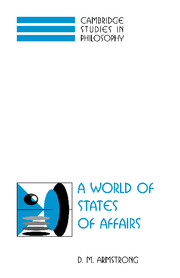Book contents
- Frontmatter
- Contents
- Preface
- 1 Introduction
- 2 Some preliminary doctrines
- 3 Properties I
- 4 Properties II
- 5 Powers and dispositions
- 6 Relations
- 7 Particulars
- 8 States of affairs
- 9 Independence
- 10 Modality
- 11 Number
- 12 Classes
- 13 Totality states of affairs
- 14 Singular causation
- 15 Laws I
- 16 Laws II
- 17 The unity of the world
- References
- Index
9 - Independence
Published online by Cambridge University Press: 03 February 2010
- Frontmatter
- Contents
- Preface
- 1 Introduction
- 2 Some preliminary doctrines
- 3 Properties I
- 4 Properties II
- 5 Powers and dispositions
- 6 Relations
- 7 Particulars
- 8 States of affairs
- 9 Independence
- 10 Modality
- 11 Number
- 12 Classes
- 13 Totality states of affairs
- 14 Singular causation
- 15 Laws I
- 16 Laws II
- 17 The unity of the world
- References
- Index
Summary
We are arguing for a world of states of affairs, where each state of affairs is a contingent being. If a's being F is a state of affairs then a and F might have existed, but the state of affairs might not have existed. Again, the constituents a and F themselves might not have existed. They, too, are contingent beings. These constituents are (thin) particulars and universals. The universals may be monadic, that is properties, or polyadic, that is relations. The relations are all external. Every truth, necessary as well as contingent, so runs the hypothesis, finds its truthmaker or truthmakers here. A weaker hypothesis, which may survive even if the strong hypothesis is false, is that these contingent states of affairs are the truthmakers for all contingent truths.
The particular question now to be raised is whether these states of affairs are independent of each other, as Wittgenstein said his atomic facts are. Our concern is with first-order states of affairs alone. (For Wittgenstein, of course, there are no facts except first-order facts.) Higher-order states of affairs are (non-supervenient) states of affairs concerning lower-order states of affairs, facts about facts, and so automatically entail the existence of the lower-order states of affairs. Independence must, quite trivially, fail for them.
It is assumed here that there are first-order states of affairs. It could be, in some sense of ‘could be’, that the world is such that every state of affairs is a higher-order state of affairs relative to some further states of affairs.
- Type
- Chapter
- Information
- A World of States of Affairs , pp. 139 - 147Publisher: Cambridge University PressPrint publication year: 1997



